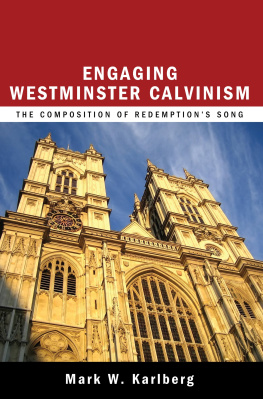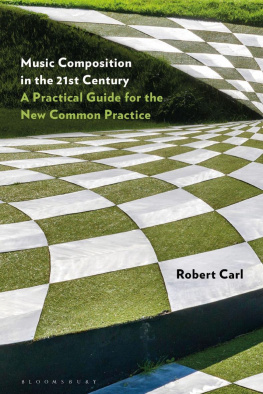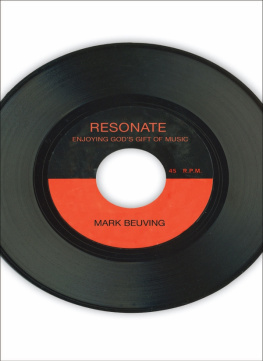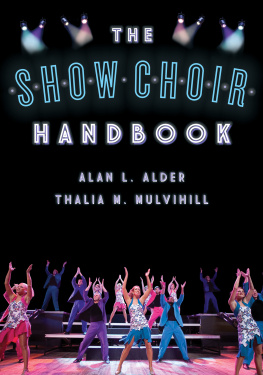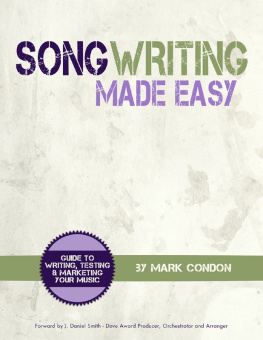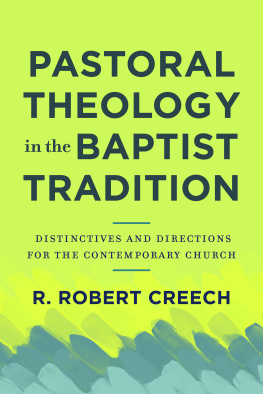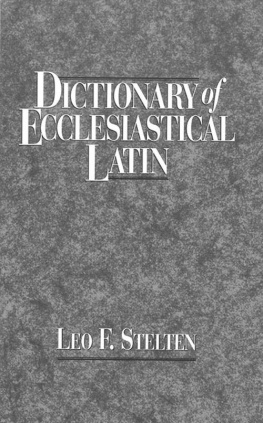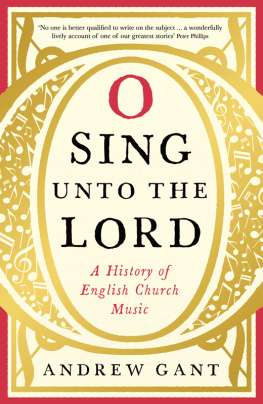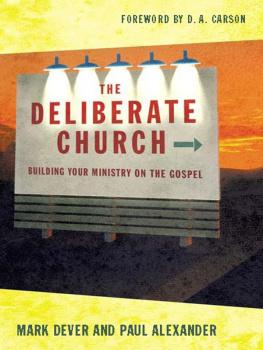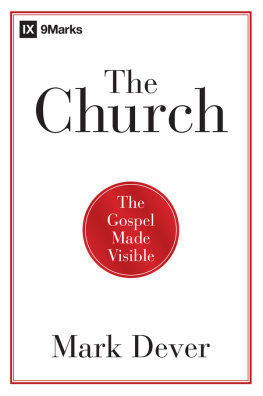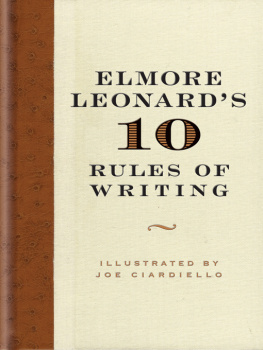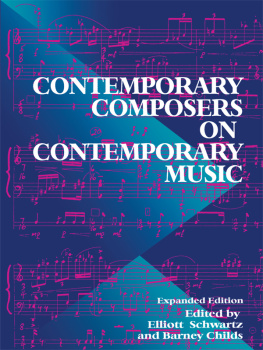Mark W. Karlberg
Sola Gratia: The Signature of the Reformation
Part 1Todays Church: Standing or Falling?
A staple in international, orthodox Calvinism from the opening days of the Protestant Reformation has been the theological distinction between the Law and the Gospel. What does this distinction mean, and how important is it? Simply put, it contrasts two, divinely ordained ways to the obtainment of life eternal, one by meritorious works (i.e., by the Law) and one by unmerited grace and favor (i.e., by the Gospel). This fundamental antithesisreiterated time and again throughout the Bible, both Old and New Testamentslies at the very core of Protestant evangelical theology, Lutheran and Reformed. Contrary to the claim made by some recent historians of doctrine, there is no disagreement or discord between these two leading Protestant traditions concerning this vital, theological distinction. Differences of interpretation within Lutheranism and Calvinism do appear with respect to how these two principles of inheritance, works versus faith (i.e., law versus grace), apply to the various covenants in the Bible, beginning with the unique Covenant of Works established by God with Adam in the Garden of Eden at creation, and followed by the subsequent covenants spanning the history of redemption, all of which are subsumed under the rubric of the Covenant of Grace (exceptions include Gods covenantal pledge to uphold and govern all humankind in accordance with his common grace).
It was this basic, theological antithesis between the Law and the Gospel that led Martin Luther to recover the biblical doctrine of justification by faith alonejustification apart from the works of the Law, even the good works of believers (see Eph 2:10). In his classic study, The Bondage of the Will , Luther described the desperate plight of sinners. By nature (since Adams transgression), humankind is in bondage to sin and death. Only the mercy and grace of God in Christ can remedy the consequences of the Fall. The salvation of sinners is the manifestation of the predestinating, electing love of God. The sovereign Lord of the covenant secures for the sinner that which he cannot obtain for himself. Salvation is all of grace.
So important was this teaching of the Bible that Luther insisted it was the defining article (i.e., doctrine) of the standing or falling church. Any admixture of faith and works (obedience which is in accordance with the law of God, the good works of those regenerated, sanctified, and renewed in the image of Christ) is, according to the great apostle Paul, anathema. Why are the good works of believersworks that evidence the obedience of faith (Rom 1:5), works truly pleasing to Godexcluded from justification (with respect to its constitutive aspect)? Very simply put, the reason is that what is required by the justice and holiness of God for salvation, (re)union and communion with God, is perfect obedience. The purpose of Christs first coming was to make atonement for sin and to secure the promised inheritance, viz., a people redeemed by the blood of the Lamb. The ground or basis of salvation is the righteousness of Christ alone. His perfect obedience is the exclusive, meritorious basis of life and salvation for sinners, those chosen in Christ by the Father in eternity past. The doctrine of Christs meritorious obedience is meaningful only in the context of the system of doctrine taught in the Bible. Here the interpreter of Scripture must come to grips with the Protestant-Reformed teaching concerning the Law and the Gospel.
Before commenting further upon the distinctive formulations of Reformed covenant theology, views different from classic Lutheranism, we must first consider why at present we are facing a radical shift in theological thinkinga shift that has led to a crisis in modern-day Protestant evangelicalism. The single most important factor giving rise to radical reinterpretations of the biblical doctrine of justification, election, and the covenants is the impact that the Neo-orthodox theology of Karl Barth has had upon evangelicalism, both Reformed and non-Reformed varieties. Barth is (mistakenly) considered by many to be the leading Reformed thinker of the twentieth century. Recognizing the fallacy and bankruptcy of nineteenth-century Protestant theology, Barth undertook a remake of traditional Protestant orthodoxy, what resulted in a theology having superficial resemblance to the theology of Luther and Calvin (most especially the latter). Barth ended up with a new school of theology known as Neo-orthodoxy. To be sure, Barth is a complex theologian. But one thing is certain upon a close reading of his work: Barth is no friend of orthodox, biblical Christianity. (Of course, there are evangelicals who will challenge this evaluation. They do so erroneously.) From the standpoint of the history of doctrine, it was Barth who spearheaded the transformation of contemporary evangelical theology, the form now dominant. He has vigorously maintained that there is no theological antithesis between the Law and the Gospel. On this subject, argues Barth, the orthodox Protestant scholastics were wholly misguided and misinformed. (It is important to recognize here that Barth distinguished sharply between the teachings of Calvin and that of scholastic Calvinism.)
Among the philosophico-theological considerations that entered into Barths thinking was the (unbiblical) notion of divine grace as that which undergirds and sustains all creationincluding the recreation of all things in Christ, the Elect Man, the one man for all. Jesus Christ, according to Barth, is the mysterious, yet sublime, revelation of Gods electing and reprobating will, the seemingly contrary motion of God at work in the redemption of the world. Stated in terms of the doctrine of justification, election, and covenant, Barth taught that there is but one covenant in Scripture, the Covenant of Grace (hence Barths doctrine of mono-covenantalism). Implicit in this interpretation is Barths christomonism, the notion that Christ is the fountain or source of life and death, so that in him lie the final resolution and reconciliation of all things in heaven and in hellall to the benefit of the worlds redemption (hence Barths implicit universalism). There is no ultimate conflict between the love and the wrath of God. Christ has overcome evil; such is the triumph of divine grace.
According to Barth, Law and Gospel are merely twin sides of Gods promissory commandthe divine command that humankind be in subjection to his sovereign rule and reign, and the divine promise that he is Lord of all. Law is an expression of Gods grace; Grace is an expression of Gods law in the world. Gods image-bearer is never in a position of earning or meriting the love and favor of God. All is received by grace through faith. Humankinds fall from grace is remedied in the death and resurrection of Christ on behalf of all humanity. Christ is the New Man, the new humanity. The Old Manhumanity in rebellion against God, in rejection of his gracehas been subdued and renovated by the messianic Lord, the Son of Man. In Christ humanity stands righteous before God, free from all condemnation and sin. Jesus Christ has exhausted the wrath of God for every man. Although evangelicalism may certainly not agree with Barth in all respects of his formulations, there is growing consensus that Law and Grace are not antithetical means of inheriting the favor and blessing of God. In particular, the Reformed doctrine of an original Covenant of Works has been widely denounced as speculative and unbiblical.

